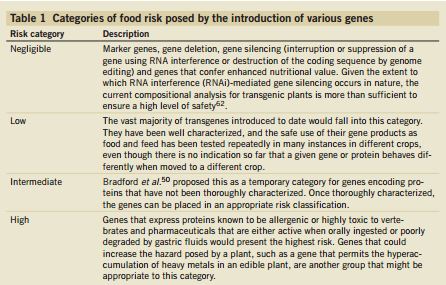A due from the American Council on Science and Health Board of Scientific Advisers has a peer-reviewed article featured in the Nature Biotechnology journal. Gregory Conko, J.D. 0f the Competitive Enterprise Institute, and Dr. Henry Miller, Robert Wesson Fellow in Scientific Philosophy and Public Policy at the Hoover Institution, Stanford University, along with colleagues Drew L. Kershen, Earl Sneed Centennial Professor of Law Emeritus at the University of Oklahoma College of Law, and Wayne A. Parrott, a professor at the Institute for Plant Breeding Genetics & Genomics, University of Georgia, Athens, call for reform of genetically modified foods, and recommend that governing bodies consider actual hazard or risk with determining the level of scrutiny.
To-date, harm from genetically modified foods has been nothing but a fantasy promoted by anti-science activists at groups like Natural Resources Defense Council and Greenpeace, along with their allied media outlets such as Mother Jones magazine.
Why then, is a hand-picked panel of National Academies of Science scholars set to say the current system, where a salmon that grows faster takes nearly two decades to get approval, is acceptable, and even that the next generation of food science, such as RNAi, should also be held hostage by the precautionary principle?
That's the concern. To prevent science policy from being hijacked by activists within groups like NAS (1), Conko et al. state that a risk-based regulatory approach is needed. This seems obvious, but we certainly don't have one now and haven't for decades, we have policy by press release. In the Wall Street Journal, I tripped up the Proceedings of the National Academies of Science (PNAS) by exposing that they let papers walk through peer-review if an academy member gave them a free pass, a disastrous policy exploited by agenda-based scientists funded by groups like Pesticide Action Network to get special Scientific Advisory Panels called about a product, which wasted millions of dollars in taxpayer funding that could have been used for science. It all happened because a shoddy stuff got a stamp of legitimacy, environmental groups did a press release, the New York Times did an article, and EPA was told to investigate.
After my article called them out, they changed that policy but that does not mean they have changed their culture. (2) That is why, loathe as I am to say it, new regulations that reflect the modern world may be needed. To protect science from activism.
Rules to cover cutting-edge science are contrived, the authors note. That is not how things should be done. Instead, they advance a common-sense solution:
 Credit: doi:10.1038/nbt.3568
Credit: doi:10.1038/nbt.3568
The status quo has been a financial boon for anti-science groups. When you combine Union of Concerned Scientists, Environmental Working Group, Center for Science in the Public Interest, Natural Resources Defense Council, Greenpeace, Environmental Defense Fund and all the rest, it is almost $1 billion in revenue per year gained by promoting fear and doubt about the modern world, but that is not better for the public.
As they write, "It is past time for regulatory reform that will begin to alleviate the public’s misapprehensions and the excessive burdens on the research community by making regulation commensurate with the level of risk."
Absolutely true.
NOTES:
(1) Other treats they have handed to the public under the pretense of science - that female-named hurricanes are more dangerous because men are sexist, black people look blacker when the economy is bad, crosswalks are racist, and that a pesticide turns male frogs into female frogs.
(2) Their incoming President, Dr. Marcia McNutt, is politically reliable, no surprise when the organization she comes from, the American Association for the Advancement of Science (AAAS) only hires from one political party, but that may be the reason she can't right the ship so it represents all Americans.


